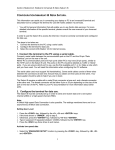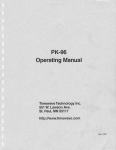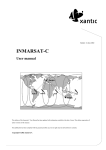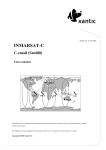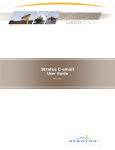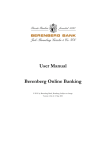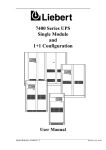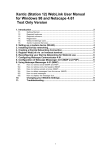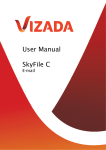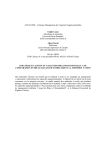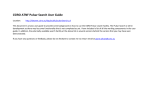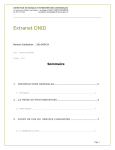Download Xantic Inm-C DRP manual
Transcript
Date: 9 August 2003 INMARSAT-C Data Reporting & Polling services User manual This edition of this User Manual has been updated with information available at the date of issue. This edition supersedes all earlier versions of this manual. This publication has been compiled with the greatest possible care, but no rights may be derived from its contents. Copyright 2003 Xantic B.V. Content 1 2 INTRODUCTION: GENERAL INFORMATION................................................................................... 3 1.1 1.2 ABOUT THIS MANUAL....................................................................................................................... 3 CUSTOMER SERVICES ...................................................................................................................... 3 1.3 1.4 REGISTRATION FOR THE DATA REPORTING AND POLLING SERVICE ....................................................... 3 BILLING AND CHARGES ..................................................................................................................... 4 WHAT ARE DATA REPORTING AND POLLING? .............................................................................. 5 2.1 DATA REPORTING ............................................................................................................................ 5 2.2 POLLING ......................................................................................................................................... 5 2.2.1 Overview of Data Reporting and Polling .......................................................................... 6 3 4 5 6 7 DNID (DATA CLOSED NETWORK IDENTIFICATION DIGIT) ............................................................ 7 3.1 3.2 A DNID (DATA CLOSED NETWORK IDENTIFICATION DIGIT) IS NECESSARY ........................................... 7 HOW A DNID IS USED IN THE CLOSED NETWORK ................................................................................ 7 3.3 3.4 3.5 XANTIC HAS TO DOWNLOAD DNIDS.................................................................................................. 7 ONE DNID FOR A GROUP OF C-TERMINALS REQUIRES MEMBER NUMBERS ........................................... 7 MORE DNID'S IN ONE TERMINAL ...................................................................................................... 8 3.6 DNID'S ARE LINKED WITH INMARSAT OCEAN REGIONS ...................................................................... 8 DOWNLOAD PROCEDURE FOR DNID'S ........................................................................................... 9 4.1 CHECKING SUCCESSFUL DOWNLOADING ............................................................................................ 9 4.2 4.3 4.4 POSSIBLE PROBLEMS DURING DOWNLOADING .................................................................................. 10 NEW AND EXISTING DNIDS TO NEW TERMINALS .............................................................................. 10 EXISTING DNID'S TO NEW OCEAN REGIONS ................................................................................... 10 4.5 DELETING DNID'S ....................................................................................................................... 10 DELIVERY OF DATA REPORTS ....................................................................................................... 11 5.1 DATA REPORTS IN RAW DATA OR PLAIN LANGUAGE – DATA REPORT DELIVERY / RETRIEVAL FORMATS ... 11 5.2 DELIVERY OF DATA REPORTS VIA INTERNET E-MAIL ........................................................................... 13 POLLING VIA THE INTERNET (E-MAIL) .......................................................................................... 14 6.1 HOW TO SEND A POLL .................................................................................................................... 14 6.2 HOW TO SEND A POLL TO PROGRAM A GROUP OF TERMINALS ............................................................ 15 INSTRUCTIONS FOR 2-STAGE ACCESS TO XANTIC (LES 12 AND LES 22) ............................... 16 7.1 VIA PSDN X25 DATANET:............................................................................................................. 16 7.2 7.3 7.4 VIA PSTN MODEM: ....................................................................................................................... 17 VIA TELEX: .................................................................................................................................... 17 VIA TCP/IP ................................................................................................................................... 18 7.5 7.6 7.7 HOW TO SEND A POLL USING TWO-STAGE ACCESS........................................................................... 18 HOW TO RETRIEVE DATA REPORTS USING TWO-STAGE ACCESS ......................................................... 18 POLL PARAMETERS ........................................................................................................................ 19 8 EXAMPLES OF POLL COMMANDS AND DNID RETRIEVAL FOR TRIMBLE GALAXY TERMINALS ............................................................................................................................................. 20 Xantic – Inmarsat-C DR&P user manual Page 1 of 20 8.1 TRIMBLE GALAXY POLLING COMMANDS - OBTAINING MARITIME 2 PACKET SPEED AND COURSE DATA REPORT ................................................................................................................................................... 20 8.1.1 8.1.2 8.1.3 Example of Program Poll format ...................................................................................... 20 Example of Initiate - Start Poll format.............................................................................. 20 Example of Stop Poll format............................................................................................. 20 8.1.4 8.1.5 8.1.6 Download Poll – Special Privilege Required.................................................................... 21 Deletion Poll – Special Privilege Required....................................................................... 21 Immediate Poll Examples.................................................................................................. 22 8.1.7 Program, Initiate and Stop Poll......................................................................................... 26 APPENDIX A – DIAL-IN NUMBERS / ADDRESSES............................................................................... 29 APPENDIX B – GLOSSARY ..................................................................................................................... 31 Xantic – Inmarsat-C DR&P user manual Page 2 of 20 1 INTRODUCTION: general information 1.1 About this manual This manual describes the principles of Data Reporting and Polling and how to setup this service via Xantic. This Inmarsat-C service with worldwide coverage offers fleet managers a fast and cost effective method of data transmission. In general Data Reporting and Polling is integrated in logistic information systems (for instance a fleet management system). This manual does not give a description of the different systems. 1.2 Customer Services For more information on Data Reporting, Polling and other Xantic services please contact: Xantic website: www.xantic.net Xantic Customer Services Email: [email protected] Access via Australia Tel: +61 7 5498 0000 Fax: +61 7 5498 0098 Telex: (71) 22432 TELCSC AA Access via the Netherlands Tel: +31 70 343 4543 Fax: +31 70 343 4796 Access from Inmarsat-C terminal: Special Access Code: 68 (free of charge) 1.3 Registration for the Data Reporting and Polling service Before you can use the service you have to register at Xantic. After your account has been established, Xantic Customer Services will provide you with the following information: • DNID number + member number(s). • Username and password for access via telephone-modem, X25 datanet, telex, Internet TCP/IP and optional for Internet e-mail. Contact Xantic Customer Services for an application form or download it from our website: www.xantic.net/products/Inmarsat C. Xantic – Inmarsat-C DR&P user manual Page 3 of 20 1.4 Billing and charges The Data Reporting and Polling service requires direct billing from Xantic. Each month you will receive a specified bill containing: • • Charge per Poll. Charge per member number for each data report depending on the size: Small (1-8 bytes) • Medium (9-20 bytes) Large (21-32 bytes) Initial registration fee per DNID if applicable • Set-up fee per terminal ID if applicable A price list is available at Xantic Customer Services and at our website. Xantic – Inmarsat-C DR&P user manual Page 4 of 20 2 What are Data Reporting and Polling? Data Reporting and Polling are Xantic Value Added Services based on Inmarsat-C. The Data Reporting service is intended for transferring small quantities of data (e.g. a position report) from an Inmarsat-C terminal to a predetermined address. This predetermined address could be an Internet email address, a telex, telephonemodem, X25 datanet or fax (delivery to an Internet TCP/IP address is under investigation and will be implemented in the future; please contact your sales manager to assess your request). The Polling service allows a fleet manager to send small quantities of data to one or more Inmarsat-C terminals. The Poll or Tele-command may initiate some action, for example ask for a Data Report to be transmitted or for a pump to be turned off. 2.1 Data Reporting Data Reports make efficient use of the Inmarsat-C system. Data packets limited to a maximum of 256 bits (32 bytes) are transmitted via signalling channels of the Inmarsat-C network. Time and costs are saved by avoiding switching to a messaging channel. Data Reports can be sent directly from a C-terminal or commanded with a Poll. • Directly Most C-terminals can transmit Data Reports manually by means of an operator or be programmed for automatic transmission at pre-set intervals. • With Poll command The same can be achieved from a remote location (e.g. a fleet management system) by sending a Poll to the C-terminal commanding the sending of a Data Report. For details on how to configure the C-terminal for Data Reporting consult the manufacturers' manual of the C-terminal. 2.2 Polling A Poll is a short command to an individual C-terminal or group of C-terminals initiating some action, controlled by the software of the C-terminal. A fleet manager can ask for data reports, with for instance the position of his ships or trucks. Polls can be sent via Internet e-mail or with the 2-stage access method via telex, telephone-modem, X25 datanet or TCP/IP (see chapter 6 and7). For information about Poll formats see Appendix A. In order to make a C-terminal respond to a Poll it must be configured correctly. For details consult the manufacturers manual of the C-terminal. Xantic – Inmarsat-C DR&P user manual Page 5 of 20 2.2.1 Overview of Data Reporting and Polling (DNID 12345 is fictional) Figure 1 Xantic LES x12 or x22 Data Reports are sent to the Xantic’s Land Earth Station. A DNID number (e.g. 12345) is used as short address Upon receipt, Xantic automatically forwards the data report to the fleet manager or stores it in the DNID file 12345. The fleet manager may retrieve the reports at any time. Figure 2 Polling Xantic LES x12 or x22 C-terminals with attached DNID 12345 will recognise the Poll and send the requested data report. DNID 12345 is used as destination address. Xantic – Inmarsat-C DR&P user manual A Fleet Manager can send a Poll to his fleet commanding a data report. He will use the previously downloaded DNID (e.g. 12345) to address the C-terminals. Page 6 of 20 3 DNID (Data Closed Network Identification Digit) 3.1 A DNID (Data Closed Network Identification Digit) is necessary To allow Data Reporting and Polling, a closed network must be created between one or more C-terminals and the fleet owner at his office. In this closed network a short address is used in the form of a unique DNID number. Inmarsat-C terminals will address the data report to this DNID. The Xantic systems will know how to route the data report to its destination address. The DNID is also used in Polls. One DNID can be used for up to 255 C-terminals. To discriminate between Cterminals with the same DNID, each C-terminal is given a member number. To set up the service, Xantic will issue a DNID and download this DNID plus the member number over the satellite link to the C-terminal, where it will be stored. 3.2 How a DNID is used in the closed network • Polls to individual C-terminals should be addressed to a DNID indicating the • individual member number. Each time a C-terminal sends a data report, it uses the DNID as the destination address. • Depending on the arrangement with the fleet manager Xantic will directly deliver the data report via internet e-mail, PSTN (telephone modem), PSDN (X25 datanet), fax or telex, or store the data report in a DNID file. The fleet manager may access the DNID file and retrieve the data reports at a convenient time. 3.3 Xantic has to download DNIDs Upon receipt of a completed application form, Xantic will issue a DNID (maximum of 5 digits). This DNID will be downloaded via an encoded message to the C-terminal(s) and stored in the C-terminals' memory. 3.4 One DNID for a group of C-terminals requires member numbers One DNID can be downloaded into a group of up to 255 C-terminals also called “members” (the member number can be 1 to 255). On the application form you can add member numbers to the mobile numbers of the C-terminals. Otherwise the Xantic’s Customer Service will assign the member numbers. Be aware that once a DNID has been downloaded into a terminal, all data reports generated by this terminal will be referred as coming from member number “xx”. Data reports do not contain terminal-ID information. So make sure you keep records of which terminal is associated to which member-number. Xantic – Inmarsat-C DR&P user manual Page 7 of 20 3.5 More DNID's in one terminal More DNIDs can be downloaded in an individual C-terminal. Different DNIDs allow the sending of e.g. position- or temperature reports or delivery of reports to different delivery addresses. The maximum number of DNID's depends on the type of Cterminal (consult the manufacturers specifications). 3.6 DNID's are linked with Inmarsat Ocean Regions The Data Reporting and Polling service is available in all four Inmarsat Ocean Regions. A DNID is only linked with the Ocean Region in which it is downloaded. Consequently if a C-terminal enters a new Region the DNID has to be downloaded again. If the DNID was previously downloaded in that area this will not be necessary. A DNID can only be downloaded in the Ocean Region where the C-terminal is logged in. AOR-W: Atlantic Ocean Region – West AOR-E: Atlantic Ocean Region – East IOR: Indian Ocean Region POR: Pacific Ocean Region Xantic – Inmarsat-C DR&P user manual Page 8 of 20 4 Download procedure for DNID's Downloading of DNID's will be performed by Xantic after receipt of the completed application form from the fleet manager. Xantic has two Land Earth Stations(LES) and two LES ID (12 and 22) providing global coverage for Inmarsat-C. Xantic Inmarsat-C LES IDs LES-ID 12 22 AORW 012 022 AORE 112 122 IOR 312 322 POR 212 222 In the application form you should indicate which LES ID would you like to use. Xantic will: • Issue a DNID number for the LES ID you have indicated in the form; • Download this DNID with member number into the requested C-terminal(s) (Note that on the application form you should add member numbers to the mobile ID-numbers and indicate in which Ocean Region the C-terminal is located). • • • Create a DNID file in the database at the Xantic LES Issue you with an Internet (email) or 2-stage user-ID and password Inform you You can start using the service as soon as you receive the confirmation. 4.1 Checking successful downloading The encoded message necessary for downloading a DNID is broadcasted by the Xantic Land Earth Station via the satellite link. In some cases the broadcasted messages may have been missed by the addressed C-terminal. Successful downloading can be checked at the DNID Status Screen of your Cterminal(s). For detailed instructions consult the manufacturers manual. Xantic – Inmarsat-C DR&P user manual Page 9 of 20 4.2 Possible problems during downloading Problem Solution The C-terminal was not present in the indicated Contact Customer Services and start a Ocean Region. new download procedure in the correct Ocean Region. The C-terminal is not logged in or switched off. The C-terminal must be urged to switch on and log in. The download message may have been missed because the C-terminal was busy communicating messages or lost contact with Contact Customer Services and start a new download procedure. the satellite for a short while (e.g. passed a bridge or tunnel). 4.3 New and existing DNIDs to new terminals Requests for downloading new and existing DNID’s should be completed on the application form. After receipt Customer Services will download the DNID into the requested C-terminal(s) and inform you. 4.4 Existing DNID's to new Ocean Regions C-terminals can only respond to Polls if the DNID was downloaded in that specific Ocean Region. As soon as a C-terminal enters an Ocean Region in which the DNID was never before downloaded you have to contact Customer Services for a new download procedure. Such a download request can also be sent directly from the Cterminal using the two-digit code 68# (free of charge). Fleet managers are advised to keep record of their DNID's in use and Ocean Regions where they are downloaded. 4.5 Deleting DNID's Make sure all DNIDs have been deleted before decommissioning a terminal (you can check that on the terminal itself). This will avoid a decommissioned-terminal that is re-commissioned by a new owner to still report to an old DNID. Please inform Customer Services when DNID's are not in use anymore or when a C-terminal has a new owner. Customer Services will carry out the deletion of the DNID in the C-terminal. Xantic – Inmarsat-C DR&P user manual Page 10 of 20 5 Delivery of Data reports The data reports sent from C-terminals will be deposited into a DNID file in the database at Xantic’s LES. Now there are three possibilities: 1. Data-reports can be delivered immediately to your fleet management system. 2. Data-reports can be delivered at specified intervals. 3. Data reports can be retrieved from the DNID file at Xantic. The DNID file should be contacted via 2-stage access (see chapter 7). The contents of the DNID file can be retrieved with the command DNID followed by the DNID number and Ocean Region digit. For example type DNID,12345,3 if you want to retrieve the data report(s) from a C-terminal sailing in the Indian Ocean using DNID 12345. Ocean Region Digits 0 = Atlantic Ocean West 2 = Pacific Ocean Network 1 = Atlantic Ocean East 3 = Indian Ocean Is delivery possible? Is retrieval possible? Internet e-mail yes no Telephone-modem (PSTN) yes yes X25 datanet (PSDN) yes yes Internet TCP/IP no (*) yes Telex yes yes Fax yes no (*) Only available on special project basis. Please contact your sales manager for assessment. 5.1 Data Reports in raw data or plain language – Data report delivery / retrieval formats By default, data reports are delivered as raw data (decode type: “no conversion”). Most fleet management systems will translate raw data into the right format. However Xantic can also deliver position reports in plain language (the original raw data will be “decoded” into normal text. This will be necessary for delivery on fax or telex (or email if you wish to read the report directly). You must indicate your preferences on the application form. When Xantic delivers a data report or you retrieve it from the DNID file (kind of mailbox) at the Xantic Land Earth Station (LES), a “header” could be attached before the actual data report contents. Decoding data reports – Decode type feature The Decode Type feature specifies if the actual content should be forwarded as it was received (No Conversion), whether it should be translated -if possible- into clear text (Textual Xantic – Inmarsat-C DR&P user manual Page 11 of 20 Conversion), or if a default form of additional information should be inserted before the original non-converted Data Report (T&T Default Header). The Textual Conversion option only applies to the Position Reporting Service. All other possible encoding of Data Reports cannot be recognised by the LES. Hence this option is only applicable if the customer is using only Position Reporting on a particular DNID/Ocean Region and wants to have the information in clear text. No Conversion means that the LES will make no changes to the content or appearance of the information. The T&T Default Header puts the following information in front of the actual information and forwards it as an 8-bit message to its terrestrial destination: <DNID number><CR><LF> <member number><CR><LF> <length of Data Report in bytes><CR><LF> The T&T default header option does not include any decoding. Message headers This option specifies what header information should be added to the Data Report when it is forwarded to its terrestrial destination. The features and possibilities for this option are: Use API Headers: Text header: Data header: yes or no yes <header specification> or no yes <header specification> or no The Text and Data header features here refer to the presentation of the message used on the satellite channel: a message coming in using 5-bit or 7-bit presentation is regarded ‘Text’, a message that is received using 8-bit presentation is regarded as ‘Data’. A Data Report is always considered an 8–bit message. There is however the possibility to send messages from a mobile terminal using the DNID as the specified address. In such cases the presentation can be other then 8-bit. The Text header, if specified, is used only for messages that came in using the 5-bit or 7-bit presentation. The Data header, if specified, is only used for messages that came in using the 8bit presentation. The values for these two features depend on the LES (and customer). A default header text is available, but it is possible to specify a specific header text. The API Header feature specifies whether the forwarded Data Reports or messages should have a fixed header added. The API Header (Application Program Interface) is a header that has a fixed format for specific message types regardless of the presentation type. There are five API Headers defined, used for to-terrestrial delivery: The advantage of the API header is that it contains additional information related to the message. API headers cannot be used together with the Text- and Data headers. Xantic – Inmarsat-C DR&P user manual Page 12 of 20 For more details on the data report available formats and examples, please consult the “XanticDNID delivery options manual”, available on our website or via Xantic Customer Service Centre. 5.2 Delivery of data reports via Internet e-mail As soon as a data report is received at Xantic the system will check the DNID file to find out what to do. If the data report has to be delivered via e-mail the message will be delivered to the registered e-mail address. Data reports in plain language will be delivered as normal body-part. Raw data reports will be delivered in an attachment. In the “from” field of the e-mail you will find the domain name <c.xantic.net> preceded by the member number of the mobile within the DNID. For example: [email protected] contains a data report sent from a C-terminal belonging to a certain DNID (related to LES id 12) identified as member number 37. Delivery of data reports per email is available on both LES id 12 and 22. Polling via email is only available via LES id 12. Xantic – Inmarsat-C DR&P user manual Page 13 of 20 6 Polling via the Internet (e-mail) Polls can be sent via Internet e-mail (Polling via email is only available via LES id 12). Only registered users can use this facility. When you send an email to our gateway, Xantic will verify the legitimacy of the originator. Xantic allows two methods of authentication: a) Xantic checks whether the email address of the originator has been registered at Xantic to send polls, b) if the email address is not registered, Xantic will check the legitimacy of the originator by looking at the two first rows of the body text containing a valid (registered) userid and password (this two lines will be deleted previously to sending the poll to the satellite). 6.1 How to send a Poll Polls should be addressed to [email protected] or [email protected] for LES ID 12. The Poll command and parameters should be put in the "subject" field. The parameters are separated by a comma, colon or space. The complete syntax for the Poll command is listed in Appendix A. This example shows a group poll to mobiles with DNID 12345 in Ocean Region AOR-E, requesting a Data Report If using userid & password legitimisation instead of your email address: To: [email protected] Cc: Subject: poll 1,G,12345,D,0,0,0 -----------------------------------------------userid:<your username> password:<your password> your text if poll with text Very Important remark: If using this userid & password legitimisation method, send the poll from an email address that has not also been registered for C-email (Sat400) for email only. If you cannot do this, please contact Xantic Customer Services to configure your poll/email registration most effectively. Xantic – Inmarsat-C DR&P user manual Page 14 of 20 6.2 How to send a poll to program a group of terminals The following screen dump shows a group poll. Mobiles with DNID 12345 in AORW are requested to send 2 data reports per day, starting at 0001 UTC. Note that to initiate the sending of these data reports, you need to send a second poll command: <poll 0,g,12345,d,0,0,05>. Xantic – Inmarsat-C DR&P user manual Page 15 of 20 7 Instructions for 2-stage access to Xantic (LES 12 and LES 22) For sending Polls and retrieving data-reports the 2-stage access method can be used. After registration you will receive a Username and Password. For details about Poll commands see Appendix A. In the examples below we use as username 0000username and as password password. The following instructions must be used to access Xantic LES 12 all ocean regions via the “Two Stage Access” method. They are also applicable for Xantic LES 22. Minor differences in the Header response of the LES may appear when using LES 22 (e.g. “Welcome to Xantic LES 22 PSDN services” instead of “Welcome to Burum LES PSDN services” header associated to LES 12). The examples below show the dial-in numbers / addresses corresponding to LES 12 / access number in The Netherlands (Burum). Very Important REMARK! For LES 12 PSDN access number in Australia and access numbers/ addresses corresponding to LES 22 please consult Appendix B: Xantic Inmarsat-C access numbers / addresses. 7.1 Via PSDN X25 datanet: Modem setting: 8 bits, 1 stopbit, no parity If you want to use the X-modem protocol, type: poll -x, followed by the parameters. If you want to repeat a Poll, type: poll –r <reference number>. Xantic You Remarks 02041594044 Select datanet number Xantic (in this example for LES 12) Welcome to BURUM LES PSDN Services Please enter username: 0000username Please enter password: password After the prompt > you have > access to the commands Poll and DNID quit Xantic – Inmarsat-C DR&P user manual End the connection Page 16 of 20 7.2 Via PSTN modem: Modem setting: 8 bits, 1 stopbit, no parity If you want to use the X-modem protocol, type: poll -x, followed by the parameters. If you want to repeat a Poll, type: poll -r <reference number>. Xantic You Remarks 31594249310 Select telephone number Xantic (in this example LES 12) Welcome to BURUM LES PSTN Services Please enter username: 0000username Please enter password: Password After the prompt > you have access to the commands Poll > and DNID Quit 7.3 End the connection Via telex: Xantic You 04473100+ 73100 busc nl Remarks Select telex number Xantic (in this example for LES 12) your answerback Burum land earth station 21-aug 2001 08:10 Enter user ID and PIN: 0000username password After cmd you have access to the commands Poll and DNID Cmd: Exit Xantic – Inmarsat-C DR&P user manual End the connection Page 17 of 20 7.4 Via TCP/IP Access to Inmarsat-C via the Internet Access to the Internet is accomplished by having a connection via an Internet Service Provider available at your premises. This can be a dial-up Internet account or a permanent office LAN connection to the Internet. Once having access to the Internet, you call the Land Earth Station (LES), and when the call is accepted, you have access to the Poll and DNID commands. Telnet Access Telnet access to the T&T Inmarsat-C is currently available in two modes: unencrypted and encrypted . The unencrypted mode means that all data, including PIN numbers and passwords are not secured nor authenticated. Xantic offers two encryption methods: PPTP and IPsec. For technical details on both methods please consult the manuals “Xantic Inmarsat-C PSDN TCP/IP user interface manual” and “Xantic Customer Guide to Encrypted TCP-IP Access”. The Xantic TCP/IP access addresses for LES 12 and LES 22 are provided in Appendix B. After Telneting to one of Xantic IP addresses, you will be presented with the Inmarsat-C ‘Please enter username:’ prompt. From this stage the system works just like the normal PSDN (X.25) or PSTN access. 7.5 How to send a poll using Two-Stage access Type poll <parameters> e.g. poll 1,g,12345,d,0,0,0 To finish, type: .s (pstn and psdn only) or nnnn (telex) to end the connection use quit (PSDN/PSTN) or exit (telex) 7.6 How to retrieve data reports using Two-Stage access Type DNID-number,ocean region number (AOR-W=0, AOR-E=1 IOR=3 POR=2) e.g. to retrieve reports from DNID 12345 in the IOR type DNID,12345,3 to end the connection use quit (PSDN/PSTN) or exit (telex) Xantic – Inmarsat-C DR&P user manual Page 18 of 20 7.7 Poll parameters The Poll command syntax is: POLL<ocean><P1><P2><P3><P4><P5><P6><P7><P8><P9><P10> Separation of the Poll parameters on the command line can be done by comma, colon or space. Below you find an explanation of all Poll parameters. Only the necessary parameters have to be entered. All Poll commands contain a Data Network ID (DNID). The DNID has to be downloaded to individual C-terminals before Polling can be utilised. Code Significance Description <ocean> The ocean region 0 = AOR-W; 1 = AOR-E 2 = POR 3 = IOR P1 Poll type g = group poll i = individual poll P2 DNID up to 5 digits P3 Response type d = data report m = message channel n = no response P4 Sub-address 0 – 255 P5 Address for a group poll: 0; for an individual poll: the mobile's Inmarsat-C ID number P6 Command type 00 = send unreserved report as required 04 = program unreserved data reporting 05 = initiate unreserved data reporting 06 = stop unreserved data reserving 09 = data transmission P7 Member number used in download DNID poll command 1 - 255 (1 = default) P8 start frame 4 digits (0001 – 9999) start frame number to program regular unreserved data reporting. (0 = default) P9 P10 number of reports per 3 digit number which indicated the number of data reports to be sent over 24 hours period 24 hours (maximum 500) Acknowledgement 0 - 1 (0 = default / no acknowledgement) Xantic – Inmarsat-C DR&P user manual Page 19 of 20 8 Examples of Poll commands and DNID Retrieval for Trimble Galaxy terminals 8.1 Trimble Galaxy Polling Commands - Obtaining Maritime 2 Packet Speed and Course Data Report The important factor, in obtaining a 2 packet maritime format report from Trimble galaxy terminals, is that you only need to send a carriage return after the @@ and not a line feed as well. If a line feed is sent, then you appear to get back a 1 packet Land Report. Therefore to get back a report in Maritime format with 2 packets (speed and course) use: @@<CR> .S<CR> You only want to see 3 characters accepted by the system, not a fourth, that would normally be a Line Feed character. • 8.1.1 Test conducted to Trimble Galaxy TNL 7001 unit mobile running version of firmware is 5.10. Example of Program Poll format POLL<SP><ocean region>,I,<dnid>,D,<sub-address>,<mes>,04,<member>,<frame>, <reports per day>,1<CR><enter whatever data you wish to send followed by a carriage return><CR> .s<CR> 8.1.2 Example of Initiate - Start Poll format POLL<SP><ocean region>,I,<dnid>,D,<sub-address>,<mes>,05,<member>,<frame>,<reports per day>,1<CR>@@<CR> .s<CR> This should in theory give a marine data report category with 2 packets in marine format (speed and course in first continuation packet). 8.1.3 Example of Stop Poll format STOP Poll – No @@ characters. POLL<SP><ocean region>,I,<dnid>,D,<sub-address>,<mes>,06,<member>,0,0,1<CR> .s<CR> Xantic – Inmarsat-C DR&P user manual Page 20 of 20 Some things to consider: First, the operator must allow ample time after sending the 04 program poll to the DCE for the receiver to accept the poll, tune to the LES, send the acknowledgement, and retune back to the NCS prior to sending the type 05 initiate data reports poll. Second, make sure the initiate poll is sent a minute or so after the program command to give the MES' time to receive the first poll. Third, the sub-address field must be the same for both the type 04 and 05 polls. For subaddress, enter number from 001 to 008 ; which corresponds to timers 1-8 (A through H) in Galaxy DCE. 8.1.4 Download Poll – Special Privilege Required POLL<SP><ocean region>,i,<dnid>,D,<sub-address>,<mes>,10,<member>,<frame>,<reports per day>,1<CR> .s<CR> 8.1.5 Deletion Poll – Special Privilege Required POLL<SP><ocean region>,i,<dnid>,D,<sub-address>,<mes>,11,<member>,<frame>,<reports per day>,1<CR> .s<CR> Xantic – Inmarsat-C DR&P user manual Page 21 of 20 8.1.6 Immediate Poll Examples Example of retrieval after Immediate Poll with 0@CR which is Land and 2 packets. Poll<SP>3,i,6868,d,1,450300385,00,2,0,0,1<CR> 0@<CR> .s<CR> > dnid 6868 3 Retrieving DNID data... Unknown Type Position Report Indian Ocean Region, DNID : 6868, Member Number : 2 Nothing Decoded > dnid 6868 3 Retrieving DNID data... Land Mobile Position Report Indian Ocean Region, DNID : 6868, Member Number : 2 Position : 32 00.84' S, 115 50.88' E Time of position : 04-DEC-02 05:06 Xantic – Inmarsat-C DR&P user manual Page 22 of 20 Example of retrieval after Immediate Poll with @@CR which is Maritime and 1 packets • Parameter 6 Command Type 00 being ordinary poll for data report response. poll 3,i,6868,d,1,450300385,00,2,0,0,1<CR> @0<CR> .s<CR> > dnid 6868 3 Retrieving DNID data... Unknown Type Position Report Indian Ocean Region, DNID : 6868, Member Number : 2 Nothing Decoded > dnid 6868 3 Retrieving DNID data... Maritime Mobile Position Report Indian Ocean Region, DNID : 6868, Member Number : 2 Position : 32 00.84' S, 115 50.88' E Speed : 0.0 knots, Course : 0 degree Time of position : 04-DEC-02 05:12 Xantic – Inmarsat-C DR&P user manual Page 23 of 20 Example of retrieval after Immediate Poll with @@CR which is Maritime and 2 packets • Parameter 6 Command Type 00 being ordinary poll for data report response. poll 3,i,6868,d,1,450300385,00,2,0,0,1<CR> @@<CR> .s<CR> > DNID 6868 3 Retrieving DNID data... Unknown Type Position Report Indian Ocean Region, DNID : 6868, Member Number : 2 Nothing Decoded Maritime Mobile Position Report Indian Ocean Region, DNID : 6868, Member Number : 2 Position : 32 00.84' S, 115 50.88' E Speed : 0.0 knots, Course : 356 degree Time of position : 04-DEC-02 04:48 Xantic – Inmarsat-C DR&P user manual Page 24 of 20 Example of Immediate Poll with normal CR LF so @@<CR><LF> • Parameter 6 Command Type 00 being ordinary poll for data report response. > poll<SP>3,i,6868,d,1,450300385,00,2,0,0,1<CR><LF> @@<CR><LF> .s<CR><LF> Text: 4 characters. Storing message... Submitted 02-12-04 05:34. Reference number 693377. Notice 4 characters were accepted instead of 3. This is because we actually send a CR LF instead of just the CR, we then get back a Land Position Report. > DNID 6868 3 Retrieving DNID data... Unknown Type Position Report Xantic – Inmarsat-C DR&P user manual Page 25 of 20 Indian Ocean Region, DNID : 6868, Member Number : 2 Nothing Decoded Land Mobile Position Report Indian Ocean Region, DNID : 6868, Member Number : 2 Position : 32 00.84' S, 115 50.88' E Time of position : 04-DEC-02 05:36 8.1.7 Program, Initiate and Stop Poll Program Poll • • • • @@ used in text field to obtain 2 packet Maritime Format reports from Trimble Galaxy mobiles. with data report response as well as acknowledgement report, start time 0130UTC and interval set at 300 times a day. Sub-address field should be set the same for the program , initiate and stop polls. DNID Mailbox retrieval response from LES shown in Text Conversion format. Poll<SP>2,i,6868,d,1,400022210,04,10,630,300,1<CR> @@<CR> .s<CR> 3 characters. Storing message... Submitted 03-03-07 01:13. Reference number 521197. > dnid 6868 2 Retrieving DNID data... Unknown Type Position Report Pacific Ocean Region, DNID : 6868, Member Number : 10 Nothing Decoded Land Mobile Position Report Pacific Ocean Region, DNID : 6868, Member Number : 10 Xantic – Inmarsat-C DR&P user manual Page 26 of 20 Position : 32 44.36' S, 151 34.40' E Initiate Poll • Sub-address field should be set the same for the program , initiate and stop polls. Poll<SP>2,i,6868,d,1,400022210,05,10,630,300,1<CR> @@<CR> .s<CR> 3 characters. Storing message... Submitted 03-03-07 01:22. Reference number 521687. Check the DNID Mailbox a few minutes after the program and initiate polls to make sure the mobile responds and has acknowledged receipt of the poll. You may have to send them again if the mobile is busy or not in its idle state. Note. The initiate poll has to be sent before the programmed frame time eg; In this example before frame 630 which is 0130UTC. Here is the response from the mobile to the initiate poll. >dnid 6868 2 Retrieving DNID data... Unknown Type Position Report Pacific Ocean Region, DNID : 6868, Member Number : 10 Nothing Decoded Land Mobile Position Report Pacific Ocean Region, DNID : 6868, Member Number : 10 Position : 32 43.20' S, 151 29.24' E Here are the incoming periodic data reports from the mobile which start after the initiate poll has been fully accepted by the mobile. > dnid 6868 2 Retrieving DNID data... Xantic – Inmarsat-C DR&P user manual Page 27 of 20 Maritime Mobile Position Report Pacific Ocean Region, DNID : 6868, Member Number : 10 Position : 32 36.72' S, 151 12.52' E Speed : 13.3 knots, Course : 309 degree Time of position : 07-MAR-03 01:40 Stop Poll o o No @@ required in the stop poll Sub-address field should be set the same for the program , initiate and stop polls. Poll<SP>2,i,6868,d,1,400022210,06,10,0,0,1<CR> .s<CR> 0 characters. Storing message... Submitted 03-03-07 02:07. Reference number 524176. Stop poll successful as no more periodic reports received in mailbox. > DNID 6868 2 Retrieving DNID data... Failed: Command failed. Xantic – Inmarsat-C DR&P user manual Page 28 of 20 APPENDIX A – Dial-in numbers / addresses Xantic INMARSAT-C terrestrial access dial-in numbers for both LES Ids 12 and 22 Access mode PSDN (X25) PSTN Access Dial in numbers for Dial in numbers for number in LES 12 LES 22 T&T platform T&T platform Netherlands 02041594044 None Australia 0505293150012 0505293050022 Netherlands ISDN/Asynchronous None Domestic Netherlands: 0594 249 310 International: + 31 594 249 310 Australia ISDN / Asynchronous None Domestic Australia: 08 9302 6344 International: +61 8 9302 6344 Two Stage Access Netherlands Domestic NL: 73100 Telex Australia None None International +4473100 Domestic Australia: 105050 International: +71105050 One stage Netherlands Nr. Region + InmC ID (c) Nr. Region + InmC ID (c) Telex & Australia AORW: 5844xxxxxxxx AORW: 5844xxxxxxxx AORE: 5814xxxxxxxx AORE: 5814xxxxxxxx POR: 5824xxxxxxxx POR: 5824xxxxxxxx IOR: 5834xxxxxxxx IOR: 5834xxxxxxxx Internet TCP/ IP Australia & 203.38.76.152 203.38.76.154 Unencrypted (a) Netherlands Internet TCP/ IP Australia & 203.38.76.151 203.38.76.153 Encrypted (b) Netherlands Internet E-mail (e) Normal [email protected] [email protected] (d) Polls [email protected] Polling via email not supported on 22 EGC [email protected] EGC via email not supported on 22 messages (FleetNET, SafetyNET) (a) For details, please refer to “Xantic Inmarsat-C PSDN - TCP/IP user interface manual”. This manual is available at www.xantic.net (portfolio – Inmarsat-C – supporting documents). You may also request it to Xantic Customer Service Centre. (b) For details, please refer to “Xantic Inmarsat-C PSDN - TCP/IP user interface manual” and to the “Xantic Customer Guide to Encrypted TCP-IP Access”. These manuals are available at www.xantic.net (portfolio – Inmarsat-C – supporting documents). You may also request them to Xantic Customer Service Centre (c) Please be aware that Telex routing is telex machine origin country dependent and may not necessarily use the Xantic LES Network. (d) Fixed to mobile email addressed to domain c.xantic.net will be transmitted via LES ID 12. Xantic – Inmarsat-C DR&P user manual Page 29 of 20 (e) LES 12 Mobile to Fixed calls directed to special access code 28 for email traffic from mobile will appear to be sent by [email protected]. LES 22 Mobile to Fixed calls directed to special access code 28 for email traffic from mobile will appear to be sent by [email protected]. Xantic – Inmarsat-C DR&P user manual Page 30 of 20 APPENDIX B – Glossary ++++ AAB Used in telex: End of transmission signal. Automatic Answer Back, see answer back. ABS Absent. Used in telex communications to indicate that the mobile station is logged out or not present in the area of which the telex number has been chosen. answerback AOR-E Station identification, mainly used in telex to identify the party on the line. Atlantic Ocean Region-East: Area served by the satellite above the eastern part of the Atlantic Ocean. AOR-W ASCII Atlantic Ocean Region-West: Area served by the satellite above the western part of the Atlantic Ocean. American Standard of Coded Information Interchange. bit BPS bt or BT Binary digit, element of the binary numbering system. Bits per second. Begin text, indicates that at that position the text of a message starts. byte C-email CES CI Group of bits (mostly 8) designating a character. Name to Xantic's C-email gateway service, connecting the Inmarsat-C network to the Internet (formerly called Sat400). Coast Earth Station, also called LES or Land Earth Station for land mobile use. Conversation impossible. cmd or CMD Compander Command. Compression-Expander, system to reduce noise in an Inmarsat-A voice channel(not used for Inmarsat-C) DNIC DNID EGC Data Network Identification Code. Data Network IDentification. Enhanced Group Call ENID Enhanced Network IDentity. Identification for groups of mobiles, enabling them to receive EGC messages. End Of Message signal as used in telex communications (NNNN). EOM-signal EOT-signal FleetNET End Of Transmission signal as used in telex communications (++++). One of the EGC services of Inmarsat-C, used to send selective broadcast-messages to groups of mobiles. ga or GA GMDSS Go Ahead: you may transmit. Global Maritime Distress and Safety System. Inmarsat-C is one of the communication systems supporting GMDSS. GPS HEX Global Positioning System. Navigation system based on satellite technology. Hexadecimal. ID IOR itd Identification. Area served by the satellite above the Indian Ocean. Input transaction accepted for delivery. itr LES Input transaction rejected. Land Earth Station, also called Coast Earth Station (CES) Maritime. Xantic – Inmarsat-C DR&P user manual Page 31 of 20 lf or LF MES Line feed. Mobile Earth Station, mobile terminal for land use. Modem Modulator DEmodulator, used to transmit and receive digital signals via analogue telephone lines. Message. MSG NA NDN Not Admitted. (In Inmarsat C telex communications to indicate that the mobile station is excluded from all traffic). Non Delivery Notification. NNNN NP Used in telex: End of message signal. No Party. Used in telex communications to indicate that the mobile station is unknown or not yet commissioned. NUA (X.25) PC PDN Network User Address. Personal Computer. Positive Delivery Notification. PIN Poll Personal Identification Number (used for security). A short message transmitted to one or more mobiles to generate an action by the mobile(s). This may be used to program a mobile terminal POR PSDN or to initiate a data report. Area served by the satellite above the Pacific Ocean. Public Switched Data Network. PSTN PTN rej Public Switched Telephone Network. Public Telex Network. Rejected. SAC SafetyNET Special Access Code: short code replacing a terrestrial address One of the Inmarsat-C Enhanced Group Call services, used for the distribution of maritime safety information. Sat400 Former name to Xantic's C-email gateway service, connecting the Inmarsat-C network to the Internet. Xantic's user friendly PC software package for the office and at home. SAT.PC SES store-and-forward Ship Earth Station, mobile terminal for maritime use. Messages are temporarily stored for later transmission, opposed to real time or "on-line" communications. STX STX-character Tcp / IP Start of Text. Start of Text indicator. Abbreviation for Transmission Control Protocol / Internet Protocol. Two interrelated protocols that are part of the Internet protocol suite. TCP operates on the OSI transport layer and breaks data into packets. IP operates on the OSI network layer and routes packets.. Telnet The TCP/IP standard network virtual that is used for remote terminal connection service and that allows a user at one site to interact with systems at other sites as if that user terminal were directly connected to WRU X-modem protocol computers at those sites. Used in telex: Who are you. Transmission protocol for file transfer via PSTN with automatic error X.25 detection and correction. Access protocol for a packet switched data network. Xantic – Inmarsat-C DR&P user manual Page 32 of 20


































